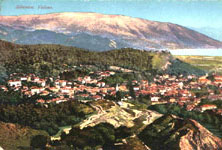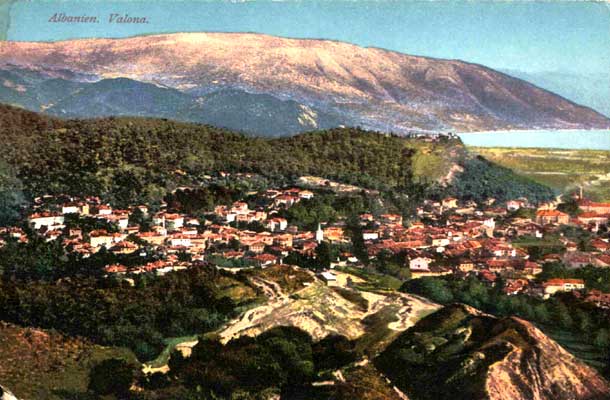| | Robert Elsie | AL Art | AL History | AL Language | AL Literature | AL Photography | Contact | |
Robert Elsie
Texts and Documents of Albanian History
BACK | AL History

View of Vlora, ca. 1920.
1497
Arnold von Harff:
Pilgrimage from Cologne
Arnold von Harff (1), a German knight, traveller and writer, was born in about 1471 into a noble family of the Lower Rhineland (Harff on the Erft, a village northwest of Cologne). In the autumn of 1496, he set out on a journey, ostensibly a pilgrimage to the Holy Land, which took him to Italy, down the Adriatic coast to Greece, Egypt, Arabia, Palestine, Asia Minor, and then back through central Europe to France and Spain. He returned to Cologne in the autumn of 1498 or 1499 and died in 1505. The account of his journey was published by E. von Groote in 1860 and is considered one of the best examples of the period of this genre of travel narrative, which was very popular at the end of the Middle Ages. The text of the narrative is in Ripuarian (Lower Rhine) German and suffers from the usual erratic orthography of the time. During his travels, von Harff was not only a keen observer of his environment, but was also interested in the languages he encountered. In the course of his narrative, he gives short lexicons of words and phrases in Croatian, Albanian, Greek, Arabic, Hebrew, Turkish, Hungarian, Basque and Breton. These constitute what one might call essential pocket vocabularies for travellers, usually including items of food, household and travel necessities and useful phrases such as: 'Good morning', 'How much does this cost?' and 'Woman, may I sleep with you?' The latter question is, incidentally, missing from the Albanian lexicon for one reason or another. It was thus on a stopover in the port of Durrës in the spring of 1497 as he was sailing aboard a merchant galley from Venice to Alexandria, that he jotted down twenty-six words, eight phrases, and twelve numbers in Albanian, which constitute one of the earliest records of the Albanian language.
From Dulcina (Ulcinj) to Duratzo (Durrës) we travelled with a bad wind. This is a great city ruined by the Turks, and is now subject to the Venetians. This city lies in Albania where they also have their own language which cannot be written well, as they do not have an alphabet of their own in this country. I have noted down several words of this Albanian language, which are written below in our letters:
1.
2.
3.
4.
5.
6.
7.
8.
9.
10.
11.
12.
13.
14.
15.
16.
17.
18.
19.
20.
21.
22.
23.
24.
25.
26.
27.
28.
29.
30.
31.
32.
33.
34.
35.
36.
37.
38.
39.
40.
41.
42.
43.
44.
45.
46.boicke
vene
oie
mische
jat
foeije
oitter
poylle
pyske
krup
myr
kyckge
megarune
pijne
tauerne
geneyre
growa
denarye
sto
jae
criste
dreck
kijrij
kale
elbe
fijet
mirenestrasse
myreprama
meretzewen
ake ja kasse zet ve
kess felgen gjo kaffs
do daple
laff ne kammijss
ne kaffs
nea
dua
trij
quater
pessa
jast
statte
tette
nante
dieta
nijtgint
nemijgobread
wine
water
meat
cheese
eggs
vinegar
a chicken
fish
salt
good
bad
to eat
to drink
a tavern
a man
a woman
money
yes
no
god
the devil
a candle
a horse
oats
to sleep
good morning
good night
good day
what do you have that I like
how much does that cost
I'll buy it
wash my shirt
what is that called
one
two
three
four
five
six
seven
eight
nine
ten
hundred
thousandWe sailed from Durrës to Sazan in five hours. This is a very fine harbour. Sazan is a small island belonging to the Turks. There are two little Greek chapels on it, one to our Blessed Lady and the other to Saint Nicholas. At the present time, the great lord of the Turks has some very fine stallions grazing on this island. To the left side of the harbour, on the mainland is a very fine, large village called Velona (Vlora), which has two thousand homes. This village is able to provide the Turkish emperor with seven hundred horsemen for war, not to mention foot soldiers. Above this village is a fine castle called Kano (Kanina), in which the Turkish emperor has an official in residence. Here in Vlora is a large river of fresh water called the Buyona (Buna) (2), which flows from Turkey from the north and enters the sea here. It comes from Sckuterym (Shkodra), a large fortified town which the Turkish emperor took from Venetian rule a few years ago. Here in Sazan there is a large harbour in which the Turks always have many vessels. Fourteen years ago, the Turks sailed across the gulf from this harbour fifty Lombard miles in some six hours to Apulia and Calabria, which belong to the King of Naples. They captured the fine and large town of Idrontum (Otranto) and many other towns, which they held for a year and a day. In this region there is a large, high mountain. From Sazan to Corfoin (Corfu) we sailed with a good wind. This island is subject to the Venetians and is about one hundred and eighty Italian miles wide. On this island is the town of Corfu and a good harbour, which we sailed into. Above the town there are two castles which protect it. The Greek language is spoken in this town.
(1) cf. V. Honemann, Zur Lieferung der Reisebeschreibung Arnold von Harffs. in: Zeitschrift für deutsches Altertum und deutsche Literatur, 107 1978, p. 165-178; A. Hetzer, Wie ist Arnold von Harffs Wörterverzeichnis (1496) zu lesen? in: Balkan-Archiv, Neue Folge, Hamburg, 6 (1981), p. 227-262; R. Elsie, The Albanian lexicon of Arnold von Harff, 1497. in: Zeitschrift für Vergleichende Sprachforschung, Göttingen, 97,1 (1984), p. 113-122; H. Beckers, Zu den Fremdalphabeten und Fremdsprachproben im Reisebericht Arnold von Harff (1496-1498). in: Collectanea Philologica. Festschrift für Helmut Gipper, vol. 1, Baden-Baden (1985), p. 73-86; E. von Groote, Die Pilgerfahrt des Ritters Arnold von Harff von Cöln durch Italien, Syrien, Ägypten, Arabien, Äthiopien, Nubien, Palästina, die Türkei, Frankreich und Spanien, wie er sie in den Jahren 1496 bis 1499 vollendet, beschrieben und durch Zeichnungen erläutert hat. Cologne (1860); and M. Letts, The Pilgrimage of Arnold von Harff... Translated from the German and edited with notes and an introduction by Malcolm Letts, London 1946, reprint 1947. (2) The Buna, flowing from Shkodra, is of course nowhere near Vlora. The author may have meant the Vjosa river. [Extract from: E. von Groote (ed.): Die Pilgerfahrt des Ritters Arnold von Harff von Cöln durch Italien, Syrien, Aegypten, Arabien, Aethiopien, Nubien, Palästina, die Türkei, Frankreich und Spanien, wie er sie in den Jahren 1496 bis 1499 vollendet, beschrieben und durch Zeichnungen erläutert hat, Cologne 1860, p. 64 66. Translated from the German by Robert Elsie. Published in R. Elsie: Early Albania, a Reader of Historical Texts, 11th - 17th Centuries, Wiesbaden 2003, p. 31-33.]
TOP
